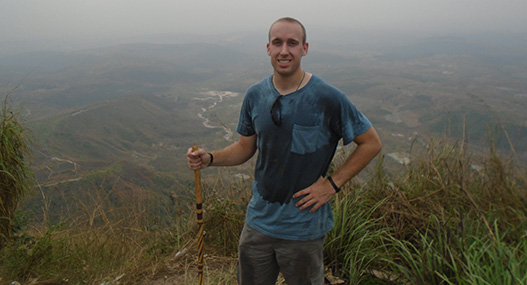
As an ROTC cadet, Dylan Doughty learns the necessary leadership skills and time management skills he needs to prepare for life after Eastern Illinois University.
Within the classroom, he studies the critical functions of becoming a manager — planning, organizing, controlling and directing — through the personal attention of EIU’s business faculty.
Yet, Doughty gained something this summer outside the classroom setting that he didn’t expect — a new sense of understanding.
Closing the Gap
Doughty traveled to the Democratic Republic of the Congo as part of the CULP (Cultural Understanding and Language Proficiency) program through the Army ROTC.
Lt. Col. Eric Savickas, commander of EIU’s ROTC Panther Battalion, said the competitive three-week program provides students like Doughty with an experience traveling with the military abroad and a taste of collaborating with other cultures. The CULP program focuses on English language training, humanitarian assistance or military training exercises.
Since cadets normally train in Fort Knox, Ky. throughout the summer, this was the first time the local battalion participated in the program.
Fellow student, Roman Meduga, participated in the program with Doughty, but he traveled to Germany. Savickas also participated in the program as a leader of cadets in Hungary.
During his 24-day trip, Savickas assisted in leading English classes with Hungarian and U.S. military students, with classes focused on conversational English.
Each day, the cadets would spend the day exercising in the morning, learning in the class, eating the cuisine and traveling the country together.
They chatted about differences and similarities of living within the United States or Hungary in the morning, while in the afternoon, they explored the country.
By participating in the trips, the cadets got a taste of another culture, he said.
For Savickas, the biggest take-away was witnessing his cadets immersed in a different culture and creating lasting friendships.
“By the end of the trip, it is like there is not an ocean separating us,” Savickas said. “There weren’t two separate cultures.”
As some point in a cadet’s military career, they will inevitably run into someone they met in the program or need to call on them for assistance. Now, they have developed a lasting relationship, and they can count on them, he said.
A New Sense of Understanding
Doughty adventured to the Democratic Republic of the Congo for the sheer reason he may never go to Africa again. Yet the trip offered him more than that.
“For me, it was eye-opening. I knew the statistics that most people in the country live on less than a $1 a day, but it never sunk in,” Doughty said. “Just by stepping off the plane, I was one of the wealthiest people as a college student.”
During his mission, he traveled with eight other cadets and an interpreter throughout the country. He quickly learned that the DRC is a diverse country like the United States. It is also considered to be the poorest country in the world, he said.
Like Savickas, Doughty interacted with military cadets, teaching them conversational English. In the classes, Doughty said they were working with the top 1 percent of the wealthiest citizens in the country.
In the morning, he added, cadets taught English to military personnel and civilians at the Congolese American Language Institute, but in the afternoon they were able to see the living conditions of the country.
Their adventures included walks around the markets, visits to orphanages and travel to natural destinations such as Mount Mangengenge and Zongo Falls.
“I know that I shouldn’t take it for granted that I have a roof over my head. I have clean running water,” he said. “I have easy access to food.”
Coming Back Home
After growing up in Germany, Meduga wanted to return. In his CULP mission, he picked Germany for that exact reason. Since he speaks German fluently, he ended up interpreting for his group.
His mission focused more on military training exercises, including the observation of different bases, mountainous areas and weapons.
During their cultural visits, they even traveled to Salzburg, Austria where they trained with the Austrian army. That training included the opportunity to shoot mortars into the mountainous ranges.
From his childhood, Meduga understood the need for American students to learn about cultures from outside the United States.
“American colleges stress study abroad because American youth live within this bubble,” Meduga said. “We don’t get exposed to different cultures.”
Doughty agrees that the CULP program gave him a taste of another culture, and, more importantly — a chance to get out of his bubble.
“The program is about exposing the cadets to knowing more than just being American,” Savickas said. “It is about understanding why people act the way they do based on hundreds and hundreds of years of history.”




